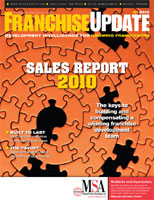Communication Breakdown: Avoiding the
It's been more than 40 years since I took my one and only psychology course. I can't say the course changed my life or showed me the light. It didn't. In fact, the only thing I really remember from it is that there are six interpretations of any two-party conversation: how Party A and Party B each perceives what they said and what they heard (that makes four); and two more, which are what I might label the truth (what Party A actually did say to Party B, and vice versa). The point, of course, is that what we think we said is not necessarily what the other party thinks they heard--and further, that what we think we said may not have been what we actually said.
Perhaps this seems an odd topic for a lawyer to be curmudgeoning on, especially in a column about franchise law. But I recently had one of my brilliant (he said modestly) yet slightly off-the-wall observations and wanted a chance to test my hypothesis on those who read this column (I am sure there are dozens). My hypothesis: In today's business (and for that matter social) environment, we communicate more, but we may really be communicating less.
Email is a great technological advance in many respects. It captures the exact words we want to convey, and the message can be delivered immediately, essentially for free. It also can be distributed to many, with little difficulty. Thus, we now rely heavily on this "wunderkind" for communicating--without realizing there can be evils in its use. What might these Dark Powers be?
In responding, let me first be lawyer. Email is to most of us a substitute for oral communication. But unlike an oral message, it does not go away once delivered. It is a virtually permanent record of the words we send. Nevertheless, we often write these messages in the same way we would speak them. Thus, when disputes arise between parties, it makes it a little more difficult to put the spin onto the story to present to a judge or jury. When the communication is in writing, it becomes more difficult to recast or maneuver its content. When the written word is involved, it is a Herculean task for a lawyer to take an email statement such as, "You're acting like a flaming ***hole," and give it the less provocative, "You're acting unreasonably."
We forget that, unlike verbal, face-to-face communication, email is flat. It often lacks emotion, it frequently lacks charm; there is often no humanity to it. This revelation came to me when I realized I had been trading emails with my best friend almost daily--but I hadn't spoken with him in more than three weeks. Back in the days before email, we would speak to each other at least once a week, usually more. Those calls were certainly more satisfying than 100 words received on my computer screen. The calls typically went beyond the limited, one-way messages we now type; they conveyed compassion, disbelief, a sense of humor, or at least humanity. In other words, communication involves more than simply the conveyance of words. And by relying on email, it often takes several rounds to accomplish what might be achieved in a single phone call, or perhaps a personal meeting. In many cases, satisfactory communication may never be achieved.
In franchising, it is easy to fall into this trap of using email as our primary means of communication, especially during the current economic mess where a penny saved a penny saved. Yet we have accepted the false premise that nothing is lost if corporate headquarters gathers information by requesting franchisees to fill in a survey online, rather than have a field representative go out and schmooze with them. The field rep visit, I would argue, is a powerful tool in maintaining a strong franchisor-franchisee relationship. It not only allows for the requisite verbal communication of information together with the other salient virtues the written word cannot express, it also provides an opportunity for the field rep to observe and feel how well the franchisees are running their business. These subjective observations will not be effectively delivered in any report the franchisees might submit, nor in their responses to a survey question such as: "Does your enthusiastic hostess liltingly say (and with proper eye contact), 'Welcome to Rupert's Bistro!" as each customer walks in through the door?"
In short, email gets certain information across, but it does not truly deliver the whole message. In many instances today involving email "communication," more has become less. Perhaps as this communications wunderkind enters adolescence, it's time to praise it for what it is, realize its limitations, and where appropriate, return to the days of yesteryear. Call me!
Rupert Barkoff is a partner in Kilpatrick Stockton LLP's Atlanta office, where he chairs the firm's Franchise Practice Group. He is a former Chair of the American Bar Association's Forum on Franchising and Co-Editor-in-Chief of Fundamentals of Franchising. He can be reached at rbarkoff@kilpatrickstockton.com.
Share this Feature
Recommended Reading:
Comments:
comments powered by DisqusFRANCHISE TOPICS
- Multi-Unit Franchising
- Get Started in Franchising
- Growth
- Operations
- Open New Units
- Leadership
- Marketing
- Technology
- Legal
- Awards
- Rankings
- Trends
- Featured Franchise Stories
FEATURED IN

Franchise Update Magazine: Issue 1, 2010






 The franchise listed above are not related to or endorsed by Franchise Update or Franchise Update Media Group. We are not engaged in, supporting, or endorsing any specific franchise, business opportunity, company or individual. No statement in this site is to be construed as a recommendation. We encourage prospective franchise buyers to perform extensive due diligence when considering a franchise opportunity.
The franchise listed above are not related to or endorsed by Franchise Update or Franchise Update Media Group. We are not engaged in, supporting, or endorsing any specific franchise, business opportunity, company or individual. No statement in this site is to be construed as a recommendation. We encourage prospective franchise buyers to perform extensive due diligence when considering a franchise opportunity.